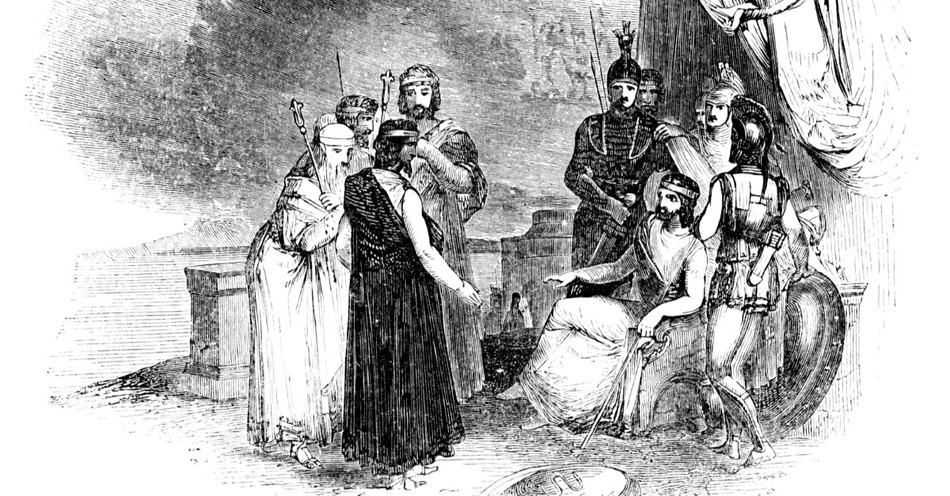Biblical kings can be confusing. King Darius in the Bible is no different. As in other royal lines, ancient Mesopotamian kings often bore the names of previous kings or went by a similar name. For instance, keeping track of all the Herods in the New Testament can be a lot of work. Kings also may have been known by different names in different territories.
There was no Israelite king named Darius, but there were at least two kings named Darius in the Old Testament who impacted the Jews. One King Darius reigned briefly in Babylon and had a memorable impact on the great prophet Daniel. The other King Darius reigned under Cyrus, the great Persian king who allowed the Jewish people to return to the Promised Land after their exile.
Where Does the Bible First Mention King Darius?
The first King Darius mentioned in the Bible, King Darius I or Darius the Great, is found in Ezra 4. The passage explains how the Jews faced opposition as they rebuilt Jerusalem. The opposition worked to “frustrate their counsel all the days of Cyrus king of Persia, even until the reign of Darius king of Persia” (Ezra 4:4-5 NAS).
However, there were several kings with the name Darius. The first King Darius chronologically was Darius the Mede, mentioned in the book of Daniel.
Both kings are recorded as having some rule over the Jews during the Dispersion or exile. Following generations of the repeated cycle of obedience followed by sin and idolatry followed by suffering then repentance then obedience again, God took the action He’d warned through the prophets that He would take. He allowed Israel to be defeated by her enemies, the Babylonians.
The Babylonians emptied Israel and dispersed the Jews throughout their territory, with various kings either enforcing their assimilation or allowing the limited practice of their faith. The Medo-Persians defeated the Babylonians. During the Persian empire, King Cyrus permitted a remnant of Jews to return to Israel. Ezra was part of that return to Israel, coming in the second wave after the wave led by Zerubbabel.
Daniel was a teen taken into Babylon when King Nebuchadnezzar defeated Israel. Daniel demonstrated great wisdom and served as counsel to the king. Nebuchadnezzar’s descendant, Belshazzar, followed, and Daniel served as his counsel. Darius’ reign followed the death of Belshazzar. Daniel grew old in exile but remained faithful to God all his days.
What Empire Did King Darius Rule?
While King Darius I, or Darius the Great, mentioned in Ezra, was the longer reigning monarch, he is lesser known in biblical history. Along with Cyrus, King Darius was instrumental in helping the Jews, under the leadership of Zerubbabel, to rebuild, especially the temple. It appears he was generous and supportive of the remnant who returned.
The King Darius that most Bible readers think of first when the name is mentioned is the king in Daniel.
King Darius, Darius the Mede, was an ancient king during the Persian empire. Easton’s Bible Dictionary states, “On the death of Belshazzar the Chaldean he ‘received the kingdom’ of Babylon as viceroy from Cyrus.”
To understand the tangled confusion of kings, leaders, satraps, etc., during this period, it’s good to remember that communication in ancient times took time.
Local rulers were designated to oversee when conquering nations swept through areas and defeated the people. So, while there was often one reigning king, that king couldn’t teleconference or have virtual meetings. There were many layers of rulers under them, reporting up the chain. This arrangement continued from the Chaldeans to the Babylonians, then through the Medo-Persians, the Persian Empire, Greek Empire, and Roman Empire. It helps to associate biblical kings with the stories recorded by the Jews.
Nebuchadnezzar threw Daniel’s three friends into the fiery furnace.
His descendant, Belshazzar, is known for the “writing on the wall.” As he was holding a great feast for thousands of nobles, he praised the “gods of gold and silver, of bronze, iron, wood and stone.” Just then, a mysterious finger (God) wrote a message on the wall of the banquet hall (Daniel 5:25).
Daniel was not only the single person who could read what God’s finger had written. He could also provide the meaning: God had found Belshazzar wanting and would end his kingdom, with the Medes and the Persians dividing it (Daniel 5:26-28). The end of Daniel 5 tells us that Belshazzar died that night and that at age 62, Darius became king.
Darius is best known now as the king who threw Daniel into the lion’s den.
Daniel had served kings with distinction for decades since his youth. He was an octogenarian by the time of King Darius. He was well-respected but also known for offering prayers to his God several times daily from his window. Darius made Daniel one of three commissioners overseeing parts of his kingdom, and Daniel distinguished himself in this as he had every responsibility in his life. Of course, this led to jealousy by the others.
Why Did King Darius Ask People to Only Pray to Him?
The other commissioners and satraps conspired to find cause to accuse Daniel of King Darius but could find none. Knowing Daniel’s zeal and diligent daily prayers to his God, they realized the only way to disparage him would be to outlaw his faith practices. In Daniel 6:6-9, they approach Darius with the idea that he should create a law that for 30 days, everyone would be required to pray only to him or face the lions.
When Daniel learned what they had done, he prayed at his usual place beside his open window. The conspirators turned him in to King Darius. Despite his admiration of Daniel and Daniel’s God, the king was subject to his own edict.
Daniel 6:16-18 says, “Then the king gave orders, and Daniel was brought in and thrown into the lions’ den. The king said to Daniel, ‘Your God whom you continually serve will Himself rescue you.’ And a stone was brought and placed over the mouth of the den; and the king sealed it with his own signet ring and with the signet rings of his nobles, so that nothing would be changed regarding Daniel. Then the king went to his palace and spent the night fasting, and no entertainment was brought before him; and his sleep fled from him.”
In the morning, King Darius rushed to the lion’s den but found that Daniel’s God had, indeed, protected him. Daniel was brought out of the den, and the king had the conspirators and their families tossed to the lions, where they were immediately devoured.
Daniel 6 closes with these words in verses 25-28, “Then Darius the king wrote to all the peoples, nations, and populations of all languages who were living in all the land: ‘May your peace be great! I issue a decree that in all the realm of my kingdom people are to tremble and fear before the God of Daniel;
For He is the living God and enduring forever,
And His kingdom is one which will not be destroyed,
And His dominion will be forever.
He rescues, saves, and performs signs and miracles
In heaven and on earth,
He who has also rescued Daniel from the power of the lions.’
So this Daniel enjoyed success in the reign of Darius, and in the reign of Cyrus the Persian.”
This King Darius served only two years (538-536 BC) but what an impact on biblical history!
Do We Know What Happened to King Darius after the Book of Daniel?
Some historians consider King Darius of the Daniel story a literary figure, not a historical king. Others, however, identify him as “Astyages,” mentioned by Greek historians. Still others await archaeological discoveries verifying the biblical text, as has happened with countless other biblical references once thought to be literary devices.
What is interesting about all the kings who were originally enemies of Israel is that Israel has survived their kingdoms. Many times, conquerors, dictators, and kings have sought to destroy the Jewish people only to find themselves footnotes in history while Israel thrives to this day.
It’s a lesson to any of us who seek to build our own kingdoms apart from God that we’re wise to seek God’s kingdom first. That is the only kingdom promising eternal rewards. The passing nature of earthly kings and kingdoms was best captured in Shelley’s haunting poem, “Ozymandius.”
I met a traveller from an antique land,
Who said—“Two vast and trunkless legs of stone
Stand in the desert. . . . Near them, on the sand,
Half sunk a shattered visage lies, whose frown,
And wrinkled lip, and sneer of cold command,
Tell that its sculptor well those passions read
Which yet survive, stamped on these lifeless things,
The hand that mocked them, and the heart that fed;
And on the pedestal, these words appear:
My name is Ozymandias, King of Kings;
Look on my Works, ye Mighty, and despair!
Nothing beside remains. Round the decay
Of that colossal Wreck, boundless and bare
The lone and level sands stretch far away.”
Photo Credit: Getty Images/Christine_Kohler
This article is part of our People of Christianity catalog that features the stories, meaning, and significance of well-known people from the Bible and history. Here are some of the most popular articles for knowing important figures in Christianity:
How Did the Apostle Paul Die?
Who are the Nicolaitans in Revelation?
Who Was Deborah in the Bible?
Who Was Moses in the Bible?
King Solomon's Story in the Bible
Who Was Lot's Wife in the Bible?
Who Was Jezebel in the Bible?
Who Was the Prodigal Son?









